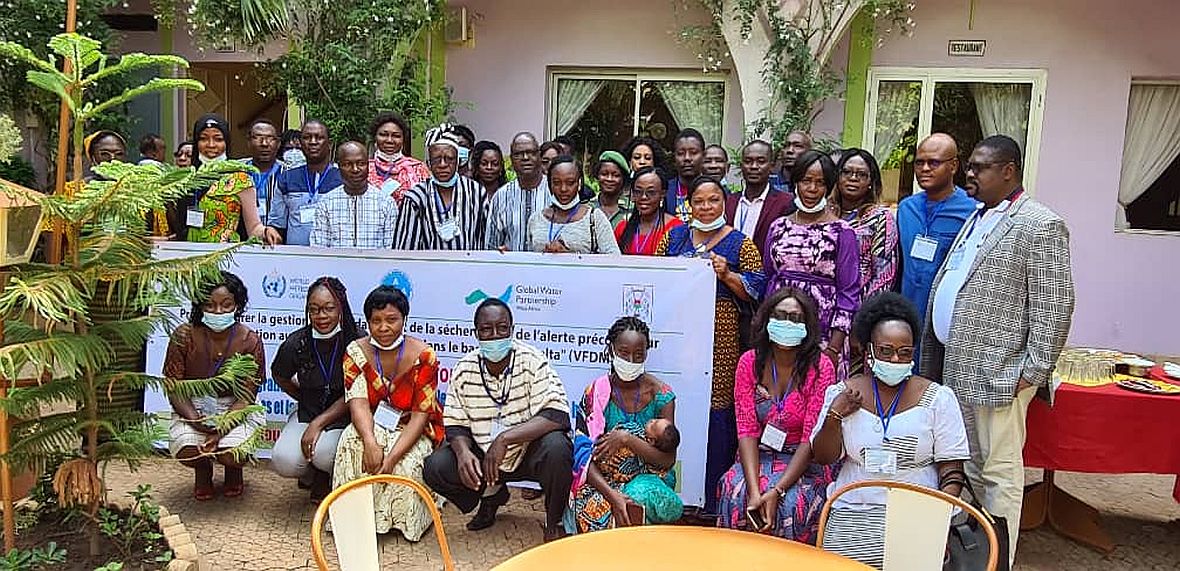Both events, which are part of the capacity building of development actors to better prevent and manage flood risks in the Volta Basin, are organized under the implementation of the project entitled ‘‘Integrating Flood and Drought Management and Early Warning Systems in the Volta Basin (VFDM 2019-2023)" funded by the Adaptation Fund.
The training workshop in Bobo Dioulasso brought together twenty-seven (27) participants including twenty (20) women and seven (7) men from Hydrological Services, Meteorological Services, Structures in charge of Civil Protection, Women's Organizations and Community Organizations at the national and local levels in the Volta Basin in Burkina Faso.
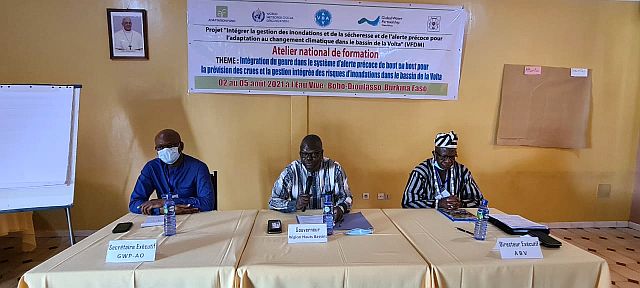 The opening ceremony of the workshop was chaired by the Governor of the Hauts Bassins region, Mr. Antoine ATIOU. It was marked by the words of welcome of the Executive Secretary of GWP-WA, Mr. K. Armand HOUANYE, the speech of the Executive Director of VBA, Mr. Robert Y. DESSOUASSI and the opening speech of the Governor of the Hauts Bassins region.
The opening ceremony of the workshop was chaired by the Governor of the Hauts Bassins region, Mr. Antoine ATIOU. It was marked by the words of welcome of the Executive Secretary of GWP-WA, Mr. K. Armand HOUANYE, the speech of the Executive Director of VBA, Mr. Robert Y. DESSOUASSI and the opening speech of the Governor of the Hauts Bassins region.
The participants, through exchanges, agreed on the official definitions of the key concepts related to the end-to-end early warning system for flood forecasting (E2E- EWS-FF), to the integrated flood management (IFM) and to gender. They were also able to understand the steps of the E2E- EWS-FF and the IFM as well as the activities of each of both processes. Practical exercises allowed participants to identify the usual gender dimensions related to flooding in E2E- EWS-FF and IFM on the one hand, and on the other hand to make commitments at different levels for the development of gender-sensitive E2E- EWS-FF and IFM. This training gave the participants the opportunity to use in practice the tools to carry out a gender analysis and mainstream gender into the planning, programming, budgeting and monitoring-evaluation of E2E- EWS-FF and IFM processes. A mechanism for periodic monitoring of the use and valorization of the knowledge gained at different levels in the Volta Basin has been defined with post-training roadmaps for each group of actors.
 Participants, as new gender ambassadors for E2E- EWS-FF and IFM considering gender related aspects, committed themselves to implement the post-training roadmaps, to disseminate the results of the workshop in their institutions and to organize training workshops targeting their colleagues.
Participants, as new gender ambassadors for E2E- EWS-FF and IFM considering gender related aspects, committed themselves to implement the post-training roadmaps, to disseminate the results of the workshop in their institutions and to organize training workshops targeting their colleagues.
Participants invited decision makers, especially from the national level, to increase investments in the acquisition, maintenance and securing of data collection and management equipment by paying more attention to the training of personnel in the E2E- EWS-FF -Gender chain.
 Recommendations for decision-makers at the regional and local levels include, among other things, to better consider priorities related to E2E- EWS-FF and IFM in local and regional development planning, and to set up/operationalize disaster risk reduction platforms or committees that integrate E2E- EWS-FF and IFM as well as gender. Each region should thus be equipped with vulnerability and flood risk maps. Development partners including WMO, GWP-WA and VBA are invited to support the implementation of the post-workshop roadmaps and to involve the participants in the implementation of the VFDM project activities and more generally in their ongoing and future initiatives in the Volta basin.
Recommendations for decision-makers at the regional and local levels include, among other things, to better consider priorities related to E2E- EWS-FF and IFM in local and regional development planning, and to set up/operationalize disaster risk reduction platforms or committees that integrate E2E- EWS-FF and IFM as well as gender. Each region should thus be equipped with vulnerability and flood risk maps. Development partners including WMO, GWP-WA and VBA are invited to support the implementation of the post-workshop roadmaps and to involve the participants in the implementation of the VFDM project activities and more generally in their ongoing and future initiatives in the Volta basin.
The day of decision-makers was attended by eight (8) local and regional authorities, including seven (7) men and one woman: the Mayor of Gaoua, the Head of the Gender Department of the Regional Council of the Hauts Bassins, the 1st Deputy Mayor of District 7 of Bobo-Dioulasso, the 1st Deputy Mayor of Bama, the Mayor of Dédougou, the Secretary General of the Regional Council of the Centre West, the Communication Officer of the Regional Council of the Boucle de Mouhoun and the Secretary General of the Regional Council of the South West Region.
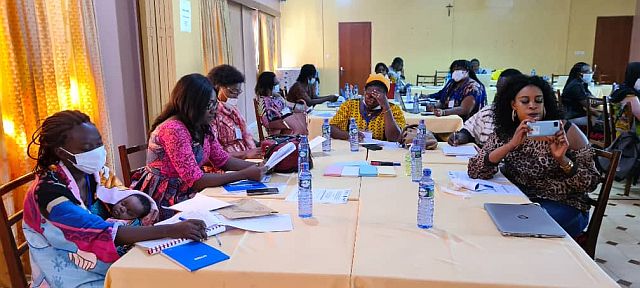 Participants of this day were able to follow and exchange on the presentation of the Volta basin highlighting main problems and challenges related to the IFM in the said basin, the stakes and commitments related to mainstreaming gender into the prevention and management of flood risks, the key messages on Gender, E2E- EWS-FF and IFM, the commitments of the participants and their recommendations to the decision-makers and development partners at different levels.
Participants of this day were able to follow and exchange on the presentation of the Volta basin highlighting main problems and challenges related to the IFM in the said basin, the stakes and commitments related to mainstreaming gender into the prevention and management of flood risks, the key messages on Gender, E2E- EWS-FF and IFM, the commitments of the participants and their recommendations to the decision-makers and development partners at different levels.
Participants expressed their entire satisfaction by stating that all their expectations raised at the beginning of the workshop were met.
A WhatsApp group was created to allow participants and trainers as well as the members of the Consortium WMO VBA and GWP-WA to maintain contact and continue post-training exchanges.
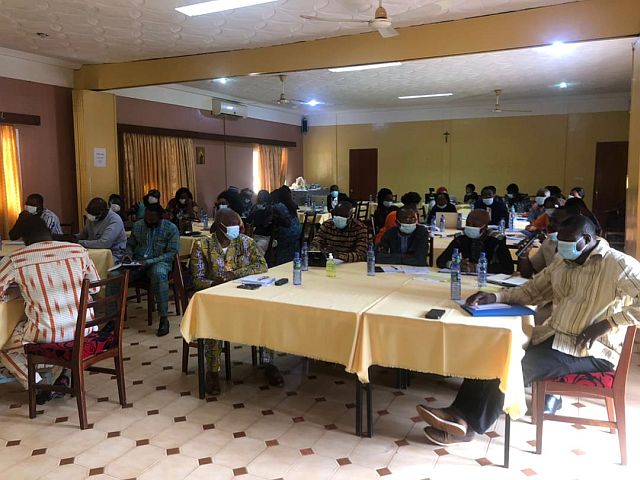 A follow-up of the implementation of the recommendations made will be done to mitigate the negative impacts of floods and improve the living conditions of the communities in the Volta Basin.
A follow-up of the implementation of the recommendations made will be done to mitigate the negative impacts of floods and improve the living conditions of the communities in the Volta Basin.
The Volta Basin, the 9th largest basin in sub-Saharan Africa, has been experiencing for a decade, like other river basins in Africa and in the West African sub-region, the adverse effects of climate change, characterized, among other things, by the exacerbation of increasingly frequent extreme phenomena such as floods and droughts leading to loss of human life and significant economic damage.
Faced with these extreme hydro-climatic phenomena, which also have natural dimensions and whose occurrence cannot be prevented, one of the appropriate and sustainable responses is to strengthen the capacities for action and adaptation of institutional actors and communities, particularly women, girls, and boys. The latter are highly vulnerable to the impacts of climate change because of their difficulties in accessing to resources and their rights and in participating to decision-making bodies related to the prevention and management of climate risks.
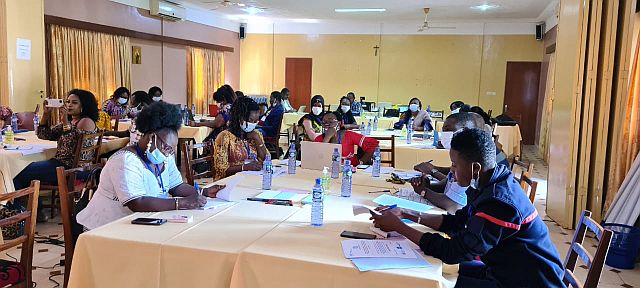 It is therefore urgent that everybody at all levels works to mainstreaming gender into all steps of the E2E- EWS-FF and IFM mechanisms and processes. This strategic approach will ensure that the vulnerabilities and needs, capacities and skills of women and men as well as girls and boys are better considered in IFM on the one hand; and on the other hand, to ensure that interventions in this area benefit to people who are really affected. It also offers the opportunity for better targeting entry points to effectively address existing gender stereotypes and reduce gender inequalities, thereby contributing not only to building safer and more resilient communities, but also to inclusive and socially just societies.
It is therefore urgent that everybody at all levels works to mainstreaming gender into all steps of the E2E- EWS-FF and IFM mechanisms and processes. This strategic approach will ensure that the vulnerabilities and needs, capacities and skills of women and men as well as girls and boys are better considered in IFM on the one hand; and on the other hand, to ensure that interventions in this area benefit to people who are really affected. It also offers the opportunity for better targeting entry points to effectively address existing gender stereotypes and reduce gender inequalities, thereby contributing not only to building safer and more resilient communities, but also to inclusive and socially just societies.
